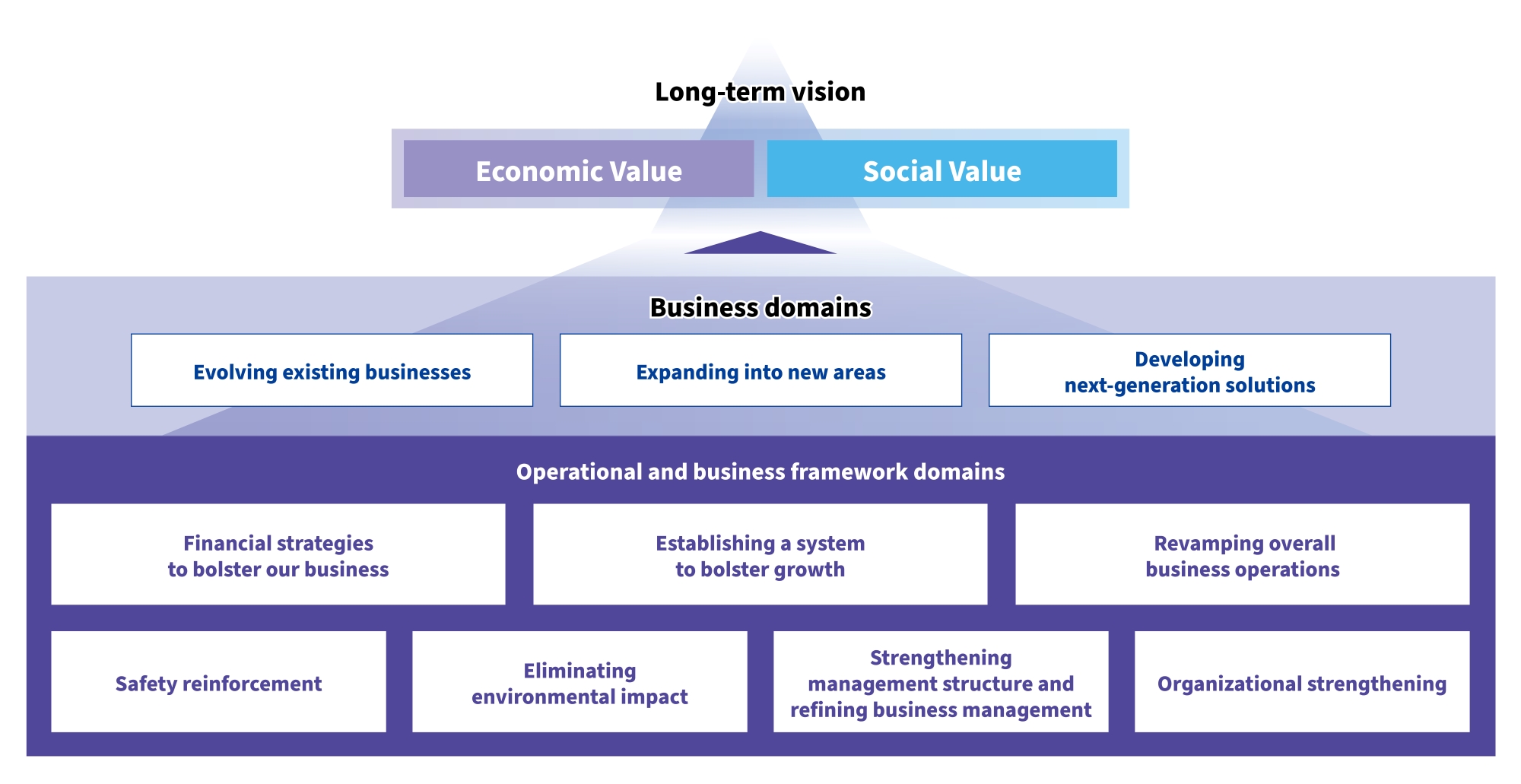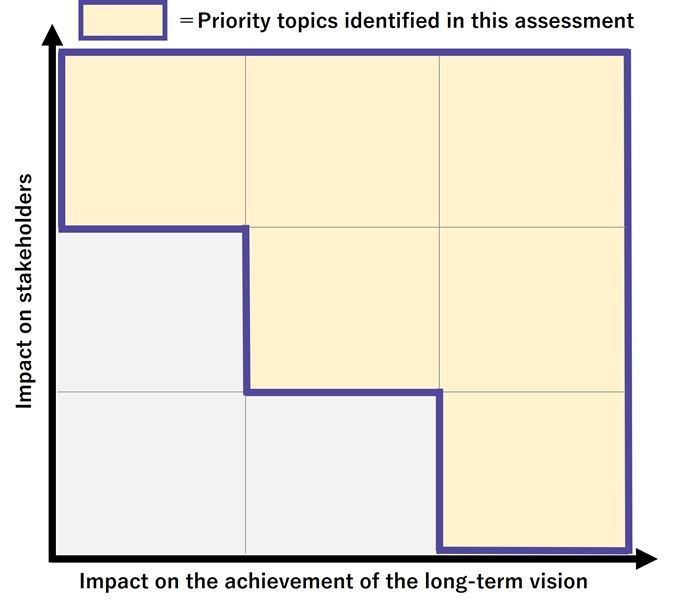Materiality
Daifuku’s Priority Topics
Please enlarge the screen to view

In May 2024, Daifuku reviewed our priority topics along with the formulation of the four-year business plan for 2027. In formulating this business plan, we backcasted from our vision of future society and arranged the products and services (outputs) that the Group provides to its customers as well as the value (outcomes) that is provided to society through such outputs. We then considered what we would like our company to look like in 2030 in terms of both economic and social value and established our long-term vision, Driving Innovative Impact 2030.
In this business plan, we have defined the priority topics that must be addressed by the Group to achieve our long-term vision, and we have specified strategies, measures, and action plans based on these topics. The list of priority topics, the KPIs (key performance indicators) associated with each topic, and the identification processes are as shown below.
Long-Term Vision and Four-Year Business Plan
List of Priority Topics
| Framework | Priority topic | Desired outcome |
|---|---|---|
| Evolving existing businesses, expanding into new areas, developing next-generation solutions | Development utilizing advanced technologies including AI | Utilize cutting-edge technologies such as AI, IoT, and other digital technologies in pursuit of further automation and optimization through our products and services to engage in sustainability-oriented development. |
| Expansion of service business | In order to maximize the value provided to customers throughout the entire life cycle of the system, from delivery to disposal, continuously create new services valuable to customers in addition to enhancing our service options and improving service standards. | |
| Development of new domains and creation of new businesses | Strengthen the marketing function to search for areas of growth, customer needs, and social issues, the function to search for application fields for proprietary technologies, and the planning function to formulate strategies; realize the development of new domains and the creation of new businesses originating from social issues and new technologies. | |
| Establishing a system to bolster growth | Investment and platform fortification for innovation creation | Strategically invest management resources in areas of growth. Acquire and develop specialized personnel who will bring about innovation; establish and operate personnel and evaluation systems that encourage taking on challenges. In addition, create a mechanism to promote collaboration with external partners and open innovation to create higher value products, services, and technologies. |
| Revamping overall business operations | Social responsibility in the supply chain | Reform systems and mechanisms in order to strengthen cooperation with suppliers and substantially improve productivity. In addition to compliance with laws and regulations, also implement initiatives to address societal demands such as labor, human rights, and the environment, and build long-term relationships of trust with stakeholders as well as a sound and sustainable supply chain. |
| Pursuit of product quality and product safety | Maintain and improve the quality of products and services through operational innovation. Provide products that customers can handle safely and securely without accidents or problems. | |
| Safety reinforcement | Ensure occupational safety and health | Safety is the foundation of our business activities and supersedes all else—based on this slogan, establish a corporate culture in all workplaces that prioritizes safety and health for all workers. |
| Eliminating environmental impact | Addressing climate change | Achieve carbon neutrality by 2050 through the development and provision of products and services that contribute to the creation of a decarbonized society, the efficient use of energy at Group sites and suppliers, and the introduction of renewable energy. |
| Promoting resource recycling | Contribute to the formation of a recycling-based society by reducing the amount of water and other resources used, extending the service life of products, minimizing the amount of waste generated at production sites, and expanding the recycling of used products and parts. | |
| Coexisting with nature | Based on an understanding of the impact of business activities on the global environment, minimize negative impacts on natural capital such as air, water, and soil through the sustainable use of ecosystem services and conservation of biodiversity. | |
| Strengthening management structure and refining business management | Strengthening governance | Strengthen corporate governance and establish an effective Group governance and compliance system to ensure sound management of the Group and a foundation for mid- to long-term growth. Additionally, ensure the effectiveness of risk management by strengthening the system to properly manage and effectively monitor critical risks that may affect the achievement of management objectives throughout the Group. |
| Fulfillment of stakeholder communication | Contribute to the realization of a sustainable society by understanding the demands of society and changes in the market environment through dialogue with internal and external stakeholders (customers, shareholders and investors, business partners, local communities, and employees). | |
| Organizational strengthening | Staff recruitment, retention, and training | Attract and retain diverse talent with the expertise and skills necessary to realize our long-term vision. Establish and operate systems that enable each individual to achieve high performance and skill development. |
| Respect for human rights | Recognize that respect for human rights is one of our most important responsibilities in terms of the sustainable growth of our business and organization, and identify, assess, correct, mitigate, and prevent any possible negative impacts on human rights occurring through our business activities. | |
| Diversity and inclusion | Cultivate a corporate culture in which the diversity of workers with a variety of different perspectives, values, and abilities is respected, and in which individual abilities can be maximized. | |
| Improvement of employee engagement | Increase employee engagement with the company by continuously reviewing the human resource system and work environment; achieve work-life balance for employees. |
KPIs Related to Each Priority Topic
In this business plan, we have set KPIs and four-year (FY2024–FY2027) targets for the topics listed above, and we manage their progress annually. Please refer to the PDF and webpage linked below for details.
Materiality Assessment
STEP 1Update input information
In response to recent changes in societal demands and trends, we have reviewed and organized the information necessary to identify priority topics.
Inputs used in the materiality assessment
- Consideration of the details of previous topics (FY2021–FY2023)
- The long-term vision, Driving Innovative Impact 2030
- Results of the examination of risks and opportunities
- Trends in other companies
- Items required by ESG rating agencies
- Results of business risk studies conducted in fiscal 2023
- Sustainability-related information disclosure standards and guidelines
STEP 2Identify topics
Based on a variety of inputs, potential topics were selected by appointed persons from business units and the Corporate Functions divisions (four executive officers, nine members of the administrative office) and evaluated based on two criteria: impact on stakeholders and impact on the achievement of the long-term vision.
Please enlarge the screen to view

STEP 3Validation
The topics identified, KPIs, and targets were validated and approved by the Board of Directors.
STEP 4Progress checks
Progress toward the target for each topic is reviewed by the Sustainability Management Committee and reported to the Board of Directors. We also regularly disclose our performance results externally through the Daifuku Report and our website.
Please refer to the following web page for the priority topics addressed in the Sustainability Action Plan for fiscal 2021 through fiscal 2023. Effective fiscal 2024, the Sustainability Action Plan will be integrated into our medium-term business plans, and the status of our efforts to address priority topics will be managed within the framework of our four-year business plan for 2027.
